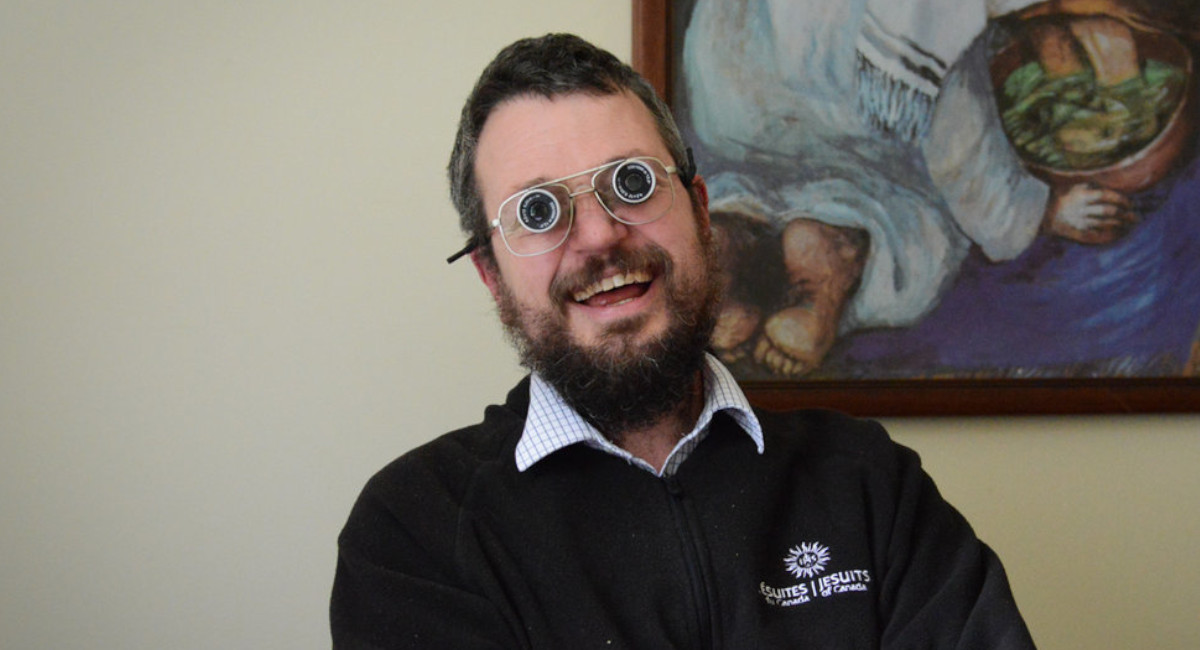 Fr Justin Glyn SJ has firsthand experience of living with a disability. Legally blind since birth, he sees life through “a fuzzy blur”. He needs telescopes attached to his eyeglasses to help focus on small areas and uses a walking cane to help him get around. But his disability, though obvious, is not the whole story.
Fr Justin Glyn SJ has firsthand experience of living with a disability. Legally blind since birth, he sees life through “a fuzzy blur”. He needs telescopes attached to his eyeglasses to help focus on small areas and uses a walking cane to help him get around. But his disability, though obvious, is not the whole story.
Fr Glyn said he wants to give voice to people with disabilities in the Church, to ensure that everyone has a role and is included. It is this advocacy work that saw him travel to Rome in September to help shape a document for the upcoming Synod on Synodality.
The resulting document, The Church is our Home, which was given to Pope Francis, pulls together the variety of voices of Catholics with disabilities from across the world. They share their experiences, desires, and reflections on how the Church can deepen its understanding, correct some misperceptions and misunderstandings, and ultimately, make some much-needed changes to ensure all are welcome and have a role to play in the Church.
Born in Namibia, Fr Justin grew up in Cape Town and Durban, South Africa. He studied and practised law in Durban and Johannesburg and, at 26, moved to New Zealand with his family. He subsequently travelled to Australia to join the Society of Jesus.
In his own life, he has experienced a “mixed bag” of reactions to his “obvious disability”. His condition, nystagmus, is the result of brain tissue not fully developing, which causes pressure on the optic nerve. His eyes “jump around” and are not able to focus. He explains, “I’ve seen moments of great kindness from people around me, and I’ve found great support in my religious community, but elsewhere, I’ve also experienced misunderstanding and physical abuse.
“There’ve been people who’ve come up and tried to rip the glasses off my face and tell me that I need to pray to Jesus and I’ll be healed. I’ve had the stares. And certainly, in the broader society, I’ve been spat at and hit on the streets because I look obviously different.
“There was a lady who watched me doing street collection for a school in South Africa, and she said to the person next to me, ‘Poor blind kid, what does he do all day?’ I said, ‘He practices law.’ I could hear her jaw drop.”
Fr Glyn emphasises the importance of accessibility. “People with disabilities had often been regarded as objects of charity, rather than [acknowledging] the fact that all of us are humans, and yet not all of us are accommodated by our society, which is built to include some and not others.
“Churches should be accessible. Sacraments should be accessible. That might mean things like quiet, low-stimulus Masses to accommodate people with autism and other neurodivergence. It might mean something as simple as putting a ramp in to make sure people can get there.”
For Fr Glyn, documents like The Church is our Home bring to light questions of what we are doing to make our churches, both in the physical sense and in the sense of community, places where all are welcome.
“How is welcome made visible, audible, tangible at the level of the people who gather after Mass for tea? You don’t need a theology degree to smile and make somebody welcome and help make sure they can get up the stairs (or that there’s a ramp if this can’t happen) or they can walk, or they can get help to receive the sacraments, or even that they can get to church or that the sacraments can be brought to them.
“It’s about making the accommodations that allow people to be part of the body of Christ and be understood to be such, rather than paying lip service to inclusion,” he says. “We are all part of the body of Christ. And to the extent that we cut off any part of that, we lose. We’re all Church together.”
This is an extract of the article published in the Catholic Archdiocese of Melbourne website. Read the full story on melbournecatholic.org.

